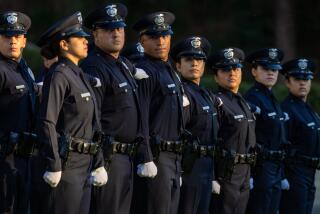Much-Maligned School Teaches Human Rights
- Share via
This weekend the School of the Americas Watch will conduct its annual protest at Ft. Benning, Ga., in its campaign to close the United States Army School of the Americas because “graduates have committed atrocity after atrocity.”
As a Latin Americanist who has no illusions about the United States’ role in supporting venal regimes, dirty wars and terror by proxy in that region, I believe that our policies and approaches have been reprehensible and must change. However, to call the School of the Americas of today a “school of the assassins,” as SOA Watch does, is anachronistic and counterproductive.
Thanks to the effectiveness of its publicity campaigns and demonstrations, what SOA Watch seeks to close is now the leading center of human rights training for the military.
SOA Watch itself has developed into much more than a protest movement at Ft. Benning. An SOA Watch session I attended in Washington, D.C., this year included sophisticated workshops on Latin America. The opportunity to educate people about Latin America and issues of social justice is invaluable. However, it is not right to continue to oppose those who teach soldiers that respect for human rights is integral to their function and identity as members of the military.
The quality of the Army school’s human rights program is testimony to its opponents’ determination. I was an observer at this year’s weeklong human rights segment of the Command and General Staff Officer Course at the school. The instructors--military and civilian--addressed complex issues of ethics and international humanitarian law in a series of rigorous and demanding classes. Fifty-eight students--33 from Latin America--received that training, which was reinforced during field exercises and other instruction during the 49-week course.
The school’s impressive human rights curriculum cannot be dismissed as propaganda. Next year’s human rights week will include a session on the 1968 My Lai massacre. A guest speaker will be Hugh Thompson, the helicopter pilot who intervened to stop the killing. For a long time after My Lai, Thompson was regarded as the bad guy, not Lt. William Calley, who was convicted of the murder of civilians there and who happens to live outside Ft. Benning.
Another guest speaker at the school next year will be my husband, active-duty U.S. Army Capt. Lawrence Rockwood, whose court-martial for actions in defense of human rights in Haiti in 1994--he conducted an unauthorized prison inspection seeking to account for political prisoners--is pending appeal to the Supreme Court. That the same army that court-martialed him and has turned down every appeal has invited him to lecture on human rights suggests that there are opportunities for dialogue that the peace community should seize.
Many leftists argue for the demilitarization of Latin America, which worldwide has the lowest percentage of military spending and training per capita. Closing the Army’s School of the Americas is not a particularly meaningful step toward demilitarizing Latin America, if that is the goal.
The same Congress that almost voted this summer to curtail School of the Americas funding is tripling the amount of money headed to Colombia to wage a drug war inextricably linked to that country’s insurgency movements. I would rather troops operating there be trained in humanitarian law than not. A Latin America where human rights are vigorously defended is a goal worth struggling hard for at this time. We peaceniks can engage all we want in wishful thinking about a world without war or injustice. In the meantime, we are better off in a world where soldiers are committed to defending international humanitarian law than in one where they are not. SOA Watch’s devoted activists could usefully turn their attention to promoting the School of the Americas’ curriculum at other training centers, such as Ft. Leavenworth, where far greater numbers of military personnel from around the world attend without receiving a single hour of human rights instruction.
In several countries, including England and Holland, active and retired military professionals have formed human rights advocacy groups that are officially affiliated with Amnesty International. In the interests of developing such a group in the U.S., we should acknowledge the changes at the School of the Americas and encourage those efforts.
More to Read
Sign up for Essential California
The most important California stories and recommendations in your inbox every morning.
You may occasionally receive promotional content from the Los Angeles Times.













